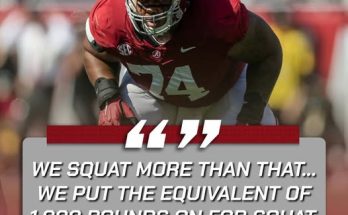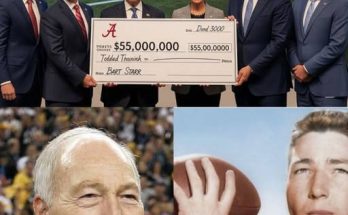The Dallas Cowboys find themselves at a critical crossroads with one of their brightest stars, Micah Parsons. The buzz around the NFL and Cowboys Nation is clear: the team is waiting too long to secure Parsons’ contract extension, and the consequences of this delay could be significant. Parsons, a dynamic force on defense, has rapidly become the heart and soul of Dallas’ defensive unit since entering the league. His ability to disrupt offenses, make game-changing plays, and lead by example has made him indispensable. Yet, despite all this, contract talks have dragged on, stirring frustration among fans, analysts, and even within the organization. The question is not just why the delay is happening, but what it could mean for the Cowboys’ future.
Micah Parsons has proven himself to be one of the NFL’s most explosive defenders. Since being drafted in the first round by Dallas, he has redefined what it means to be a linebacker in today’s game. His speed, versatility, and instinctive playmaking ability allow him to impact every snap—whether blitzing the quarterback, dropping into coverage, or stuffing the run. Parsons isn’t just a player who fills a role; he reshapes how opposing offenses prepare, forcing constant adjustments. This kind of influence is rare, especially for a player still early in his career. It’s no surprise then that the Cowboys want to keep him long term. However, the longer the contract talks linger, the more uncertainty grows around what the future holds.
One major risk the Cowboys face is the growing tension that comes from extended negotiations. Players of Parsons’ caliber deserve to be compensated accordingly, reflecting their importance to the team and the league. When contract discussions drag out without resolution, it can create distractions and tension that affect performance and team chemistry. For Parsons, the waiting game might start to feel like a lack of commitment from the Cowboys’ front office. From a business perspective, it’s understandable that teams need to carefully manage salary cap space and ensure the deal fits the broader roster plan. But for a player as impactful as Parsons, hesitation can be dangerous. If the Cowboys don’t act decisively, they risk sending a signal that they’re not fully committed to their defensive cornerstone.
Another angle to consider is the broader market dynamics around linebacker contracts and the rising salary demands for top-tier defensive talent. Parsons isn’t just any linebacker—he’s arguably the best young defensive player in the league. Other teams are watching his situation closely, ready to swoop in if he becomes available in free agency or trade talks. The NFL is an unforgiving league where talent moves quickly, and the window to lock down elite players doesn’t stay open forever. The Cowboys must balance financial prudence with the urgency of securing a player who has become a generational talent. Delaying the contract could not only jeopardize Parsons’ future with Dallas but also weaken the team’s ability to compete at the highest level for years to come.
Micah Parsons’ on-field impact transcends statistics. He embodies a rare combination of athleticism, intelligence, and relentless motor that energizes his teammates and fans alike. His presence on the field is a constant source of momentum swings, big plays, and defensive stops that can change the outcome of games. The Cowboys’ defensive identity has evolved around Parsons’ unique skill set, with coaches designing schemes to maximize his strengths. Losing or even destabilizing his role due to contract uncertainty would disrupt this carefully built system. The Cowboys know this, and it’s why securing Parsons quickly should be a top priority. The longer they wait, the greater the risk of losing a foundational piece of their defense.
The fans’ perspective adds another layer of urgency. Dallas Cowboys supporters are passionate, knowledgeable, and deeply invested in the team’s success. Parsons has quickly become a fan favorite, admired not just for his play but for his work ethic and leadership. Fans understand the importance of locking down Parsons to a long-term deal that rewards his contributions and keeps him in Dallas. The frustration over the slow pace of negotiations is palpable across social media and fan forums. Many worry that if the Cowboys don’t act soon, Parsons could seek opportunities elsewhere. In a league where superstars are the difference-makers, losing Parsons would be a blow not just on the field but also to the morale and optimism of the fanbase.
From a leadership standpoint, Parsons has emerged as a vocal and visible leader on the Cowboys’ defense. His competitive fire and commitment to excellence set the tone for the team. Leadership like this is hard to find and even harder to replace. The Cowboys are acutely aware that Parsons is not only a top defender but also a locker room influencer who inspires teammates to elevate their games. Delaying his contract extension could inadvertently send mixed messages about how much the organization values his leadership role. In professional sports, timing is critical, and showing faith in your leaders early helps solidify a strong team culture. The Cowboys need Parsons to feel fully supported and motivated, which starts with a timely and fair contract deal.
There are also practical considerations related to the NFL’s salary cap and contract structures. The Cowboys must carefully navigate the financial landscape to sign Parsons without compromising other key players or future flexibility. These decisions are complex and require balancing immediate needs with long-term strategy. However, teams that hesitate too long on marquee contracts risk having the situation spiral into something more difficult to manage. The Cowboys have the resources and leverage to get a deal done that works for both sides. The longer they wait, the more the negotiation could become complicated by outside factors or Parsons’ growing market value. Acting decisively now could save headaches later and keep the defense stable.
Media narratives and speculation also play a role in how this contract saga unfolds. Every report of stalled talks or rumored dissatisfaction feeds into a growing sense of drama around Parsons’ future. While some of this is normal in high-profile contract talks, the Cowboys would benefit from cutting through the noise with a clear, positive message. By finalizing the contract, they can shift the focus back to football and building a championship-caliber team. The distraction of prolonged negotiations can weigh heavily on everyone involved—players, coaches, management, and fans. The sooner the Cowboys end the uncertainty, the sooner they can fully rally around their defensive superstar.
Looking at the bigger picture, the Cowboys are in a position where winning now is a realistic goal. With a strong roster, including offensive weapons and a defense led by Parsons, they have a chance to compete deep into the playoffs. The risk of waiting too long to sign Parsons is that it could undermine the momentum the team has built. Stability and confidence in key players are essential ingredients for sustained success. A swift contract resolution would not only secure Parsons’ future with the team but also reinforce the Cowboys’ commitment to contending for championships. In a league where timing and chemistry matter, the Cowboys can’t afford to lose ground on this critical issue.
In summary, the Dallas Cowboys’ hesitation in finalizing a contract with Micah Parsons is causing growing concern among all stakeholders. Parsons is more than just a player; he is a transformational force whose presence elevates the entire team. Delaying the deal risks losing not only a star defender but also a leader and cultural cornerstone. The financial and strategic considerations are complex, but the benefits of securing Parsons quickly far outweigh the risks of waiting. Fans, coaches, and analysts alike see this as a defining moment for the Cowboys’ future. The time to act is now, before other factors complicate the picture or Parsons’ patience wears thin. For Dallas, signing Micah Parsons isn’t just a transaction—it’s an investment in the heart and soul of their defense and their quest for greatness.



